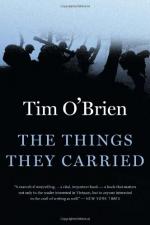|
|
The Things They Carried Chapter 7, How to Tell a True War Story
Tim says that this story is true. Rat Kiley's best friend in the world is killed. He writes a letter to the man's sister, telling her what a wonderful, daring, brave man he was. Rat pours his heart out in the letter, telling the sister just how much her brother meant to him. She never writes back. Rat despises the sister. Tim says that this story is true because it has no moral. "If at the end of a war story you feel uplifted, or if you feel that some small bit of rectitude has been salvaged from the larger waste, then you have been made the victim of a very old and terrible lie." Chapter 6, pg. 68 There is no goodness in war: there's only obscenity and evil. Rat Kiley swears viciously about the sister, because his best friend is dead and war is too much for him.
Topic Tracking: Truth 4
Topic Tracking: Effects of War 5
Rat Kiley's dead friend was Curt Lemon. They were in the deep jungle, and Rat and Curt were playing catch with smoke grenades. If it detonates in someone's hands, they only get covered with smoke--the grenades are supposed to be harmless. But then Tim hears a noise and turns to look. Curt steps out from under the trees, looking handsome, and then suddenly he disappears. Tim explains that when you watch someone die you look and then you look away and then you look back again, so that what you see becomes confused. But in fact this confusion becomes the truth. Sometimes, in fact, a true war story can't be told at all. It's beyond words. Tim gives an example: he heard this story from Mitchell Sanders. A group of men were sent out into the mountains to listen for the enemy. The mission is simple: they just sit and listen, making no sound, for a week. But it begins to drive them crazy. The mist seems to take away their bodies. They begin to hear strange sounds--rock music, chimes, etc. They can't report the music, and they can't goof around to try to forget it. They just have to sit there and listen. Then they start hearing a party, complete with clinking martini glasses. Mitchell tries to pretend he doesn't care whether or not Tim believes this, but he clearly does care. He continues: the men finally order artillery, saying that they have to destroy a whole army. They burn and blow up the entire mountainside, but they can still hear the music. They go back to their base camp, and a colonel demands to know what happened with the expensive attack. The men are totally silent, staring at him. Mitchell says, "and the whole war is right there in that stare. It says everything you can't ever say." Chapter 7, pg. 75 Later, Mitchell tells Tim that the moral of the story--which, to Tim, seems to be endless and without a moral--is that no one listens. You have to listen to your enemy, and to the silence, he says.
A true war story is something you believe with your stomach. Tim gives an example: After Curt Lemon dies, the company finds a baby water buffalo. They bring it to their camp, and Rat Kiley tries to feed it. It isn't hungry. Rat almost disinterestedly shoots the animal through the knee. He shoots it over and over. He doesn't want to kill it, he wants to hurt it. The men are amazed. Mitchell says, "Well, that's Nam. Garden of Evil. Over here, man, every sin's fresh and original." Chapter 7, pg. 80
There can be no generalizing in war, because the truths are often at odds with each other. Sometimes war is beautiful, sometimes it's horrible. Being in the midst of so much of evil makes you want to be good. Nothing seems permanent or absolute. There are no certainties. "It's safe to say that in a true war story nothing is ever absolutely true." Chapter 7, pg. 82 Often there seems to be no point, or you think of the point and then forget it before you can tell anyone. Tim remembers something that wakes him up at night: as he and Jensen pulled down pieces of Curt Lemon from the tree he flew up into when he stepped on the mine, Jensen sang the song "Lemon Tree."
True war stories are true even if they never happened. But some stories aren't true, whether they really happened or not. For example, there's one everyone knows: one man jumps on an exploding grenade to save his friends from dying as well. It may have happened, but it isn't true. This is because whether it happened or not matters. On the other hand, if the guy jumped on the grenade and everyone died anyway, that is a true story whether it happened or not.
Tim believes that if he could explain just how the sunlight seemed to pick Curt Lemon up into the air and blow him up, he could explain the final truth of Curt Lemon.
Sometimes when Tim tells the story of the water buffalo, people approach him and tell him they liked the story. Usually it is a kindly older woman, who tells him to put the war behind him. And he will think of her what Rat Kiley thought of Curt Lemon's sister: she wasn't listening. The story isn't about war; it's about love. It's about sunlight.




